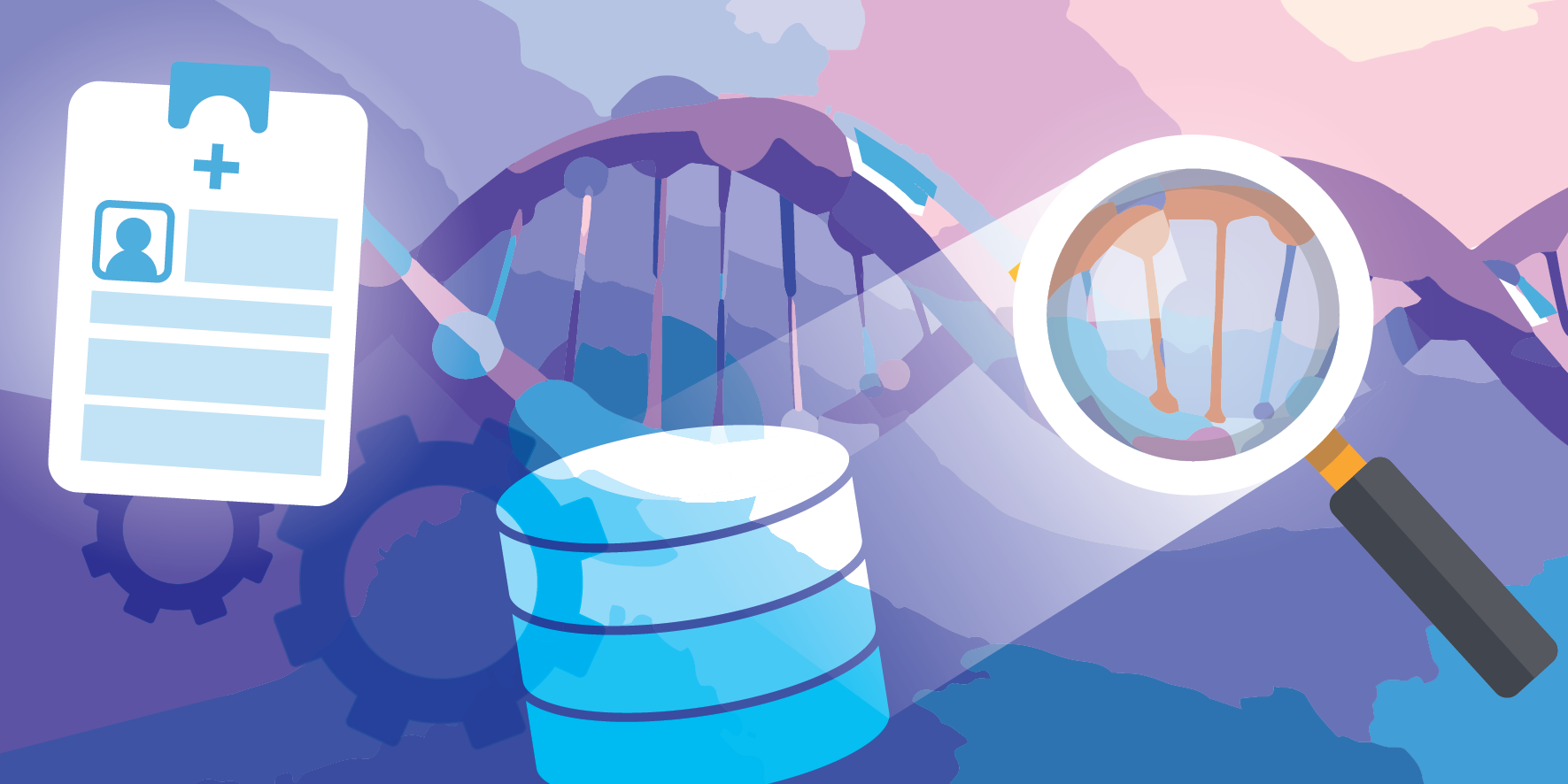About us
Learn how GA4GH helps expand responsible genomic data use to benefit human health.
Learn how GA4GH helps expand responsible genomic data use to benefit human health.
Our Strategic Road Map defines strategies, standards, and policy frameworks to support responsible global use of genomic and related health data.
Discover how a meeting of 50 leaders in genomics and medicine led to an alliance uniting more than 5,000 individuals and organisations to benefit human health.
GA4GH Inc. is a not-for-profit organisation that supports the global GA4GH community.
The GA4GH Council, consisting of the Executive Committee, Strategic Leadership Committee, and Product Steering Committee, guides our collaborative, globe-spanning alliance.
The Funders Forum brings together organisations that offer both financial support and strategic guidance.
The EDI Advisory Group responds to issues raised in the GA4GH community, finding equitable, inclusive ways to build products that benefit diverse groups.
Distributed across a number of Host Institutions, our staff team supports the mission and operations of GA4GH.
Curious who we are? Meet the people and organisations across six continents who make up GA4GH.
More than 500 organisations connected to genomics — in healthcare, research, patient advocacy, industry, and beyond — have signed onto the mission and vision of GA4GH as Organisational Members.
These core Organisational Members are genomic data initiatives that have committed resources to guide GA4GH work and pilot our products.
This subset of Organisational Members whose networks or infrastructure align with GA4GH priorities has made a long-term commitment to engaging with our community.
Local and national organisations assign experts to spend at least 30% of their time building GA4GH products.
Anyone working in genomics and related fields is invited to participate in our inclusive community by creating and using new products.
Wondering what GA4GH does? Learn how we find and overcome challenges to expanding responsible genomic data use for the benefit of human health.
Study Groups define needs. Participants survey the landscape of the genomics and health community and determine whether GA4GH can help.
Work Streams create products. Community members join together to develop technical standards, policy frameworks, and policy tools that overcome hurdles to international genomic data use.
GIF solves problems. Organisations in the forum pilot GA4GH products in real-world situations. Along the way, they troubleshoot products, suggest updates, and flag additional needs.
GIF Projects are community-led initiatives that put GA4GH products into practice in real-world scenarios.
The GIF AMA programme produces events and resources to address implementation questions and challenges.
NIF finds challenges and opportunities in genomics at a global scale. National programmes meet to share best practices, avoid incompatabilities, and help translate genomics into benefits for human health.
Communities of Interest find challenges and opportunities in areas such as rare disease, cancer, and infectious disease. Participants pinpoint real-world problems that would benefit from broad data use.
The Technical Alignment Subcommittee (TASC) supports harmonisation, interoperability, and technical alignment across GA4GH products.
Find out what’s happening with up to the minute meeting schedules for the GA4GH community.
See all our products — always free and open-source. Do you work on cloud genomics, data discovery, user access, data security or regulatory policy and ethics? Need to represent genomic, phenotypic, or clinical data? We’ve got a solution for you.
All GA4GH standards, frameworks, and tools follow the Product Development and Approval Process before being officially adopted.
Learn how other organisations have implemented GA4GH products to solve real-world problems.
Help us transform the future of genomic data use! See how GA4GH can benefit you — whether you’re using our products, writing our standards, subscribing to a newsletter, or more.
Join our community! Explore opportunities to participate in or lead GA4GH activities.
Help create new global standards and frameworks for responsible genomic data use.
Align your organisation with the GA4GH mission and vision.
Want to advance both your career and responsible genomic data sharing at the same time? See our open leadership opportunities.
Join our international team and help us advance genomic data use for the benefit of human health.
Discover current opportunities to engage with GA4GH. Share feedback on our products, apply for volunteer leadership roles, and contribute your expertise to shape the future of genomic data sharing.
Solve real problems by aligning your organisation with the world’s genomics standards. We offer software dvelopers both customisable and out-of-the-box solutions to help you get started.
Learn more about upcoming GA4GH events. See reports and recordings from our past events.
Speak directly to the global genomics and health community while supporting GA4GH strategy.
Be the first to hear about the latest GA4GH products, upcoming meetings, new initiatives, and more.
Questions? We would love to hear from you.
Read news, stories, and insights from the forefront of genomic and clinical data use.
Attend an upcoming GA4GH event, or view meeting reports from past events.
See new projects, updates, and calls for support from the Work Streams.
Read academic papers coauthored by GA4GH contributors.
Listen to our podcast OmicsXchange, featuring discussions from leaders in the world of genomics, health, and data sharing.
Check out our videos, then subscribe to our YouTube channel for more content.
View the latest GA4GH updates, Genomics and Health News, Implementation Notes, GDPR Briefs, and more.
Discover all things GA4GH: explore our news, events, videos, podcasts, announcements, publications, and newsletters.
15 Feb 2017
Almost sixty percent of the human population resides in Asia and Africa, but only a fraction of the world’s human genomic sequencing efforts cover that community. That’s more than 4 billion individuals whose genomes are not well represented by current sequencing efforts, placing them squarely outside the promise of precision medicine.

Almost sixty percent of the human population resides in Asia and Africa, but only a fraction of the world’s human genomic sequencing efforts cover that community. That’s more than 4 billion individuals whose genomes are not well represented by current sequencing efforts, placing them squarely outside the promise of precision medicine.
Genomics is a comparative science, so what you learn from sequencing one genome only becomes relevant when placed in the context of the greater whole. If that context doesn’t capture the diversity of the human population, genetic testing can lead to a host of poorly-understood results that can undermine clinical diagnoses and treatment decisions.
“For years researchers have relied on a single ‘reference genome,’ which is a completely artificial construct—there’s no single correct genome,” said Marc Fiume, co-founder and CEO of DNAstack, a cloud platform for genomics data management, analysis, and sharing. “Populations of genomes coexist, mix, and evolve together over time. We need to capture and share genetic data from these diverse populations to make appropriate comparisons.”
Fiume is the co-lead for the Beacon Project—a demonstration project of the Global Alliance for Genomics and Health (GA4GH)—which seeks to make genetic variant data easily shared and discovered worldwide. And it recently went global. Every inhabited continent is now host to a beacon, a summons to the global research community that data from that region are available and ready to be shared. With beacons in South Africa, Singapore, India, and Japan now online, the project is the first in the world to connect human genetic data across the international divide. Today, the latest of these, Global Gene Corp (GGC)’s ggcINDIA, was lit in a ceremony at Wellcome Genome Campus in the UK by India’s High Commissioner to the UK, His Excellency Patnaik, Dy. His Excellency, Chia, Dy, High Commissioner of Singapore to the UK, was also there.
ggcINDIA brings in data from both Indian citizens as well as British citizens of Indian descent. Based at the Genome Campus, GGC is a genomics data platform that aims to “democratise precision healthcare” across Asia and Africa, where the problem of misunderstood results is all too real: a subanalysis of data from the ExAC Browser—a “global reference set” of publicly accessible data from more than 60,000 individuals—looked at 192 variants classified as pathogenic among Asians and Latinos. “Only nine of them were truly pathogenic,” said GGC co-founder and Chief Scientific Officer Saumya Jamuar. “When you talk about precision medicine in Asia, you don’t have that reference of what is common and what’s not.” Over time, GGC ams to build that reference for the Asian and African populations. Already, the company has amassed the largest dataset of the Indian population.
“The only way to solve this problem is through global collaboration,” said Jamuar. “Beacon gives us the ability to reach out to that global network, and open up 20 per cent of the world’s population for analysis. Now imagine opening it to the rest of Asia and Africa and we are impacting billions.” He hopes that doing so will ultimately lead to better diagnoses and more targeted treatment approaches for the Asian and African populations.
The Beacon Project represents a new approach to data sharing, said Fiume. It is based on principles of openness and federation, which have made the Internet such a powerful tool for crowdsourcing information. “There’s no central repository of data and the network of Beacons becomes stronger as more organizations join it,” Fiume said. “We are developing tools that allow organizations to participate in an emerging ‘Internet of Genomics.’”
[1] According to patient consent.
